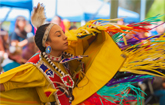WASHINGTON, Oct. 11, 2021 /PRNewswire/ -- The Internet Society will host its fifth annual Indigenous Connectivity Summit, bringing together a diverse group of stakeholders under a common goal: connecting Indigenous communities in North America to fast, affordable, sustainable Internet.
Indigenous communities are among the most underserved in terms of Internet access in Canada and the United States. In Canada, the majority of on-reserve homes – more than two-thirds – do not have high-speed Internet. In the United States, according to the Federal Communications Commission (FCC), nearly 630,000 tribal households lack access to standard broadband, a rate more than four times that of the general population.
This year's Summit will take place October 12-15, and is the second to be held virtually. Indigenous leaders, community network managers and operators, Indigenous-owned Internet service providers, community members, researchers and policymakers will join in community-led discussions to share the latest on connectivity solutions, funding sources, next-level advocacy, and success stories from Indigenous community networks in Canada and the United States.
Each year the Indigenous Connectivity Summit focuses on what can be done collectively to narrow the digital divide and expands on efforts from previous events. At the center of discussions are the pressing issues Indigenous communities in North America face as they work to access the Internet on their own terms, including disaster preparedness and recovery; access to resources, such as infrastructure, spectrum and backhaul; and capacity building.
Highlights from this year's agenda include:
- Workshops on Indigenous digital equity, accessing state, federal and private funding, and digital sovereignty, as well as lightning talks on community networks in Hawai'i and Winnipeg; sustainable networks; and the Inuvik Internet Exchange Point (IXP);
- Research presentations from the University of Hawai'i, the University of Alberta and the American Indian Policy Institute at Arizona State University; and
- Case studies highlighting Indigenous communities pursuing innovative and independent ways to connect the Internet and their unique challenges to connectivity, including Pu'uhonua o Waimanalo in Hawai'i.
The Summit will culminate in the presentation of the 2021 Policy Recommendations to help policymakers in the United States and Canada make more inclusive decisions.
Impact Over Five Years
The Internet Society, a global nonprofit organization working to promote an open, globally connected, secure and trustworthy Internet, has worked with Indigenous communities to find and implement sustainable access solutions that meet their needs. The organization formally established the Indigenous Connectivity Summit in 2017 and it remains the only community-led event of its kind.
The Internet Society offers two training courses for Summit participants. The first is the technical training, which focuses on building and operating sustainable, secure community networks.
The Policy and Advocacy training offers introductory sessions on broadband policy and advocacy, and how-to classes on government consultations and funding opportunities. The participants lead the Summit session on crafting policy recommendations, which will guide advocacy efforts through the coming year.
Over the course of five years:
- The Summit has trained nearly 300 participants as part of both the pre-Summit Community Networks and the Policy and Advocacy trainings.
- The Summit has issued 47 total policy recommendations from 2017 through 2020. These recommendations have been reflected in such reports, policies and legislation as the 2019 Arctic Council's report Improving Connectivity in the Arctic, rural development strategies and funding criteria in government programs in Canada and the U.S.
- Seventeen Indigenous Community Networks have been supported in both the United States and Canada, including Pu'uhonua o Waimanalo in Hawai'i and Ulukhaktok, Northwest Territories, among others. As part of this year's Summit, a team will be recruited to help install a second Community Network at Pu'uhonua o Waianae in Hawai'i.
- In 2020, the Internet Society assisted tribes navigating the Tribal Priority Window (TPW), providing free advice and support to tribes, including webinars and application walk-throughs. More than 400 tribes applied for a license through the TPW, and as of August 2021, 270 tribes have been issued licenses.
- In 2019, the Summit was recognized by the U.S. House of Representatives for "working to strengthen the digital bonds between America's Native communities."
"The Internet is indispensable to how we learn, work and access critical services, but too often Indigenous Communities find themselves on the wrong side of the digital divide," said Mark Buell, Regional Vice President for North America at the Internet Society. "An open and trustworthy Internet, available in the manners and methods which serve users' needs, is essential in ensuring Indigenous communities are able to fully participate in this global resource. It is vital we help cultivate policies, both technical and legislative, that ensure Indigenous Communities have affordable, high-quality and sustainable Internet access."
Learn more about the 2021 Indigenous Connectivity Summit here.
About the Internet Society
Founded in 1992 by Internet pioneers, the Internet Society (ISOC) is a global non-profit organization working to ensure the Internet remains a force for good for everyone. Through its community of members, special interest groups, and 130+ chapters around the world, the organization defends and promotes Internet policies, standards, and protocols that keep the Internet open, globally-connected, and secure. For more information, please visit: internetsociety.org.
SOURCE The Internet Society

Related Links
WANT YOUR COMPANY'S NEWS FEATURED ON PRNEWSWIRE.COM?
Newsrooms &
Influencers
Digital Media
Outlets
Journalists
Opted In




Share this article